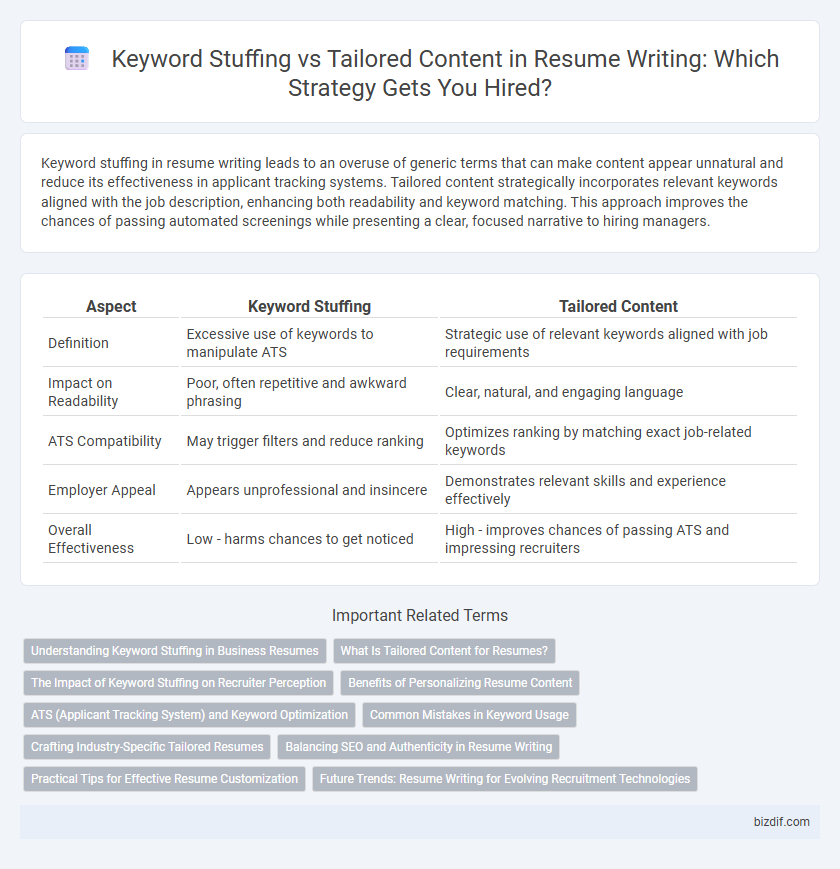Keyword stuffing in resume writing leads to an overuse of generic terms that can make content appear unnatural and reduce its effectiveness in applicant tracking systems. Tailored content strategically incorporates relevant keywords aligned with the job description, enhancing both readability and keyword matching. This approach improves the chances of passing automated screenings while presenting a clear, focused narrative to hiring managers.
Table of Comparison
| Aspect | Keyword Stuffing | Tailored Content |
|---|---|---|
| Definition | Excessive use of keywords to manipulate ATS | Strategic use of relevant keywords aligned with job requirements |
| Impact on Readability | Poor, often repetitive and awkward phrasing | Clear, natural, and engaging language |
| ATS Compatibility | May trigger filters and reduce ranking | Optimizes ranking by matching exact job-related keywords |
| Employer Appeal | Appears unprofessional and insincere | Demonstrates relevant skills and experience effectively |
| Overall Effectiveness | Low - harms chances to get noticed | High - improves chances of passing ATS and impressing recruiters |
Understanding Keyword Stuffing in Business Resumes
Keyword stuffing in business resumes refers to the excessive and unnatural repetition of industry-specific terms or phrases aimed at manipulating applicant tracking systems (ATS) rather than improving readability or relevance. This practice often results in a resume that lacks coherence and fails to demonstrate genuine skills or experience, reducing the chances of securing interviews. Effective resume writing prioritizes tailored content that strategically incorporates keywords within a clear narrative, showcasing qualifications and achievements aligned with the job description.
What Is Tailored Content for Resumes?
Tailored content for resumes involves customizing each section to align closely with the specific job description, using relevant keywords naturally within the context of your skills and experience. This approach improves applicant tracking system (ATS) compatibility and increases the chances of passing initial screenings by highlighting qualifications that directly match the employer's requirements. Avoiding keyword stuffing ensures readability and professionalism, making tailored content more effective in showcasing your suitability for the role.
The Impact of Keyword Stuffing on Recruiter Perception
Keyword stuffing in resumes often leads to a negative recruiter perception by signaling a lack of authenticity and professionalism. Overuse of keywords can disrupt the natural flow of content, making it difficult for recruiters to identify genuine skills and experiences. Tailored content, aligned with specific job descriptions, enhances recruiter engagement and improves the chances of passing automated applicant tracking systems (ATS).
Benefits of Personalizing Resume Content
Tailored resume content enhances recruiter engagement by aligning skills and experiences with specific job requirements, increasing the chances of passing Applicant Tracking Systems (ATS). Personalizing resumes highlights relevant achievements and keywords naturally, demonstrating genuine fit and expertise rather than appearing as keyword stuffing. This strategic customization improves readability and credibility, making candidates more attractive to hiring managers.
ATS (Applicant Tracking System) and Keyword Optimization
Keyword stuffing in resumes can trigger ATS filters but often reduces readability and Candidate ranking, as systems prioritize contextual relevance over sheer keyword density. Tailored content optimizes keyword placement by integrating industry-specific terms naturally aligned with job descriptions, enhancing ATS compatibility and increasing the chance of passing initial screening algorithms. Strategic use of keywords combined with clear, concise language ensures both human recruiters and ATS software recognize applicant qualifications effectively.
Common Mistakes in Keyword Usage
Overusing keywords in a resume, known as keyword stuffing, often leads to irrelevant content that can be flagged by applicant tracking systems and deter hiring managers. Common mistakes include repeating the same terms excessively, neglecting natural language flow, and ignoring industry-specific jargon that shows genuine expertise. Tailored content strategically incorporates relevant keywords within well-crafted descriptions, enhancing both readability and searchability for targeted job roles.
Crafting Industry-Specific Tailored Resumes
Crafting industry-specific tailored resumes enhances applicant tracking system (ATS) compatibility and demonstrates deep sector knowledge, increasing interview chances. Keyword stuffing dilutes resume quality, triggering ATS rejection and appearing unprofessional to hiring managers. Targeted content aligning with job descriptions emphasizes relevant skills and achievements, optimizing both human and algorithmic review.
Balancing SEO and Authenticity in Resume Writing
Balancing SEO and authenticity in resume writing involves integrating relevant keywords naturally while showcasing genuine skills and experiences. Keyword stuffing can trigger applicant tracking systems (ATS) but often makes resumes appear robotic and less credible to human reviewers. Tailored content that aligns with job descriptions enhances visibility and engagement, creating a compelling narrative that highlights qualifications without compromising readability.
Practical Tips for Effective Resume Customization
Using tailored content in resumes ensures alignment with specific job descriptions, increasing the chances of passing Applicant Tracking Systems (ATS) and catching recruiters' attention. Focus on incorporating relevant keywords naturally by analyzing job postings and integrating industry-specific terminology that matches your skills and experience. Avoid keyword stuffing, as it can lead to confusion and rejection, whereas strategic customization highlights your unique qualifications effectively.
Future Trends: Resume Writing for Evolving Recruitment Technologies
Future trends in resume writing emphasize tailored content over keyword stuffing to align with AI-driven recruitment technologies that prioritize relevance and context. Optimizing resumes with industry-specific terminology and measurable achievements enhances compatibility with advanced applicant tracking systems (ATS) utilizing natural language processing (NLP). Personalized, concise resumes focusing on skill applicability and cultural fit outperform keyword-dense documents, improving candidate visibility in automated talent acquisition platforms.
Keyword Stuffing vs Tailored Content Infographic

 bizdif.com
bizdif.com